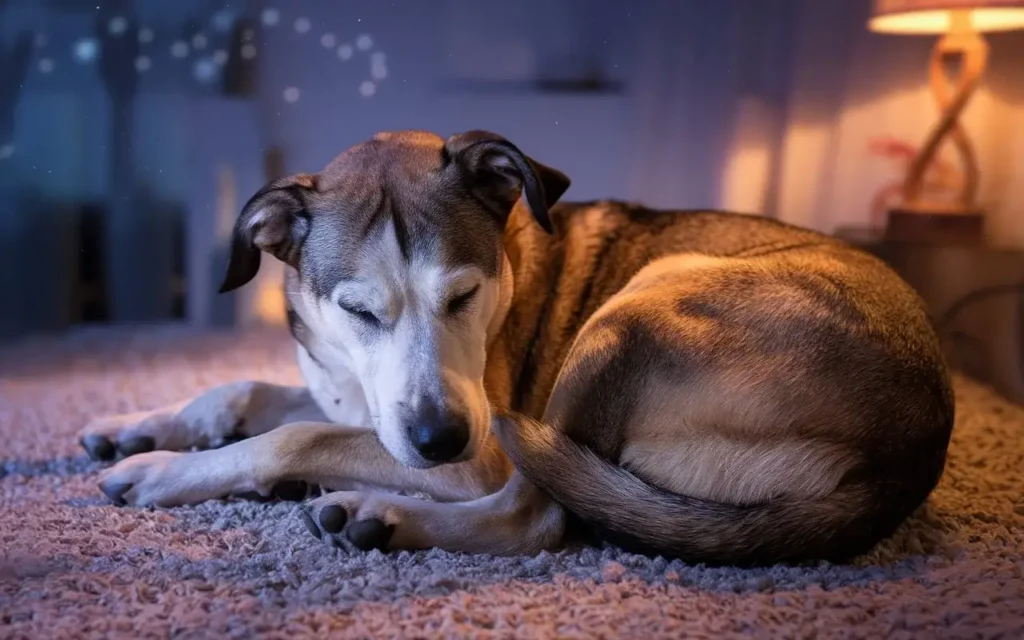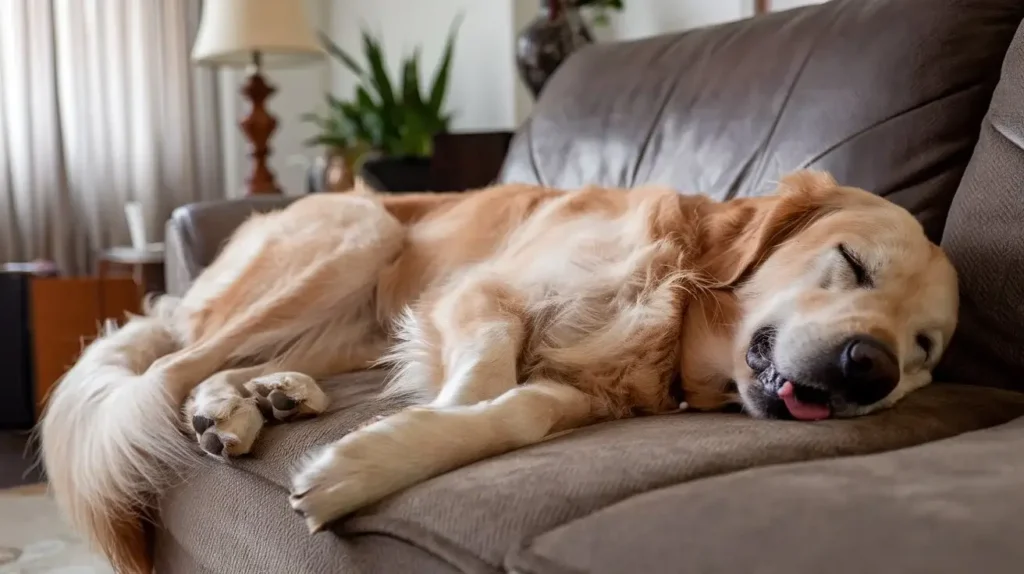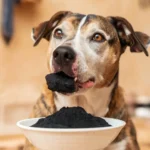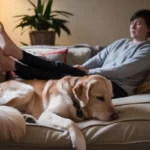Have you ever been startled by your furry friend whimpering in their sleep? If so, you’re not alone. Many dog owners have experienced this phenomenon and wondered, “Why do dogs whine in their sleep?” In this article, we’ll explore the fascinating world of canine sleep behaviors, uncover the reasons behind this common occurrence, and discuss what it means for your beloved pet’s well-being.
The Science Behind Dogs’ Sleep Patterns
REM sleep is crucial in people and dogs for the normal advancement of the sleep cycle. The brain is most active at this stage and associated with the most vivid dreams. Dogs typically begin their REM sleep after about 20 minutes into their sleeping pattern and may last a few minutes at a time. During this stage, one can very often observe one’s whining dog, or even running in place.
REM Sleep in Dogs: A Window into Their Dreams
REM sleep is a vital part of the sleep cycle for both humans and dogs. During this stage, the brain is highly active, and it’s when most vivid dreams occur. For dogs, REM sleep typically begins about 20 minutes into their sleep cycle and can last for a few minutes at a time. It’s during this stage that you’re most likely to observe your dog whining, twitching, or even running in place.

Why Do Dogs Whine in Their Sleep: Common Reasons
Now that we understand the sleep cycle of dogs, let’s explore the various reasons why dogs may whine in their sleep. From harmless dreaming to potential health concerns, there are several factors to consider.
1. Dreaming: The Most Common Cause
The primary reason why dogs whine in their sleep is simply that they’re dreaming. Just like humans, dogs can have vivid dreams that may elicit emotional responses. These dreams can be about various experiences from their day, such as:
- Playing at the park
- Chasing squirrels
- Enjoying their favorite treats
- Interacting with their human family members
When dogs dream about these experiences, they may vocalize their emotions through whines, barks, or other sounds. This is a normal and harmless behavior that shouldn’t cause concern in most cases.
2. Processing Daily Experiences
Another reason why dogs may whine in their sleep is that they’re processing their daily experiences. Sleep plays a crucial role in memory consolidation and learning for both humans and dogs. As your furry friend replays the events of the day in their sleep, they may vocalize their emotions or reactions to these memories.
3. Anxiety or Stress
Sometimes, dogs may whine in their sleep due to anxiety or stress. If your dog has experienced a particularly stressful event or is going through changes in their environment, this may manifest in their sleep behavior. Common stressors for dogs include:
- Moving to a new home
- Introduction of a new family member or pet
- Changes in routine
- Loud noises or unfamiliar environments
If you suspect that anxiety or stress is causing your dog to whine in their sleep, it’s essential to address the underlying cause and provide a calm, comfortable sleeping environment.
4. Physical Discomfort or Pain
In some cases, dogs may whine in their sleep due to physical discomfort or pain. This could be related to:
- Arthritis or joint pain
- Digestive issues
- Recent injuries
- Age-related discomfort
If you notice that your dog’s sleep whining is accompanied by other signs of discomfort during waking hours, it’s best to consult with your veterinarian to rule out any underlying health issues.
Why Do Dogs Bark and Whine in Their Sleep: Understanding Vocalizations
While whining is a common sleep behavior in dogs, some may also bark or make other vocalizations during their slumber. This combination of barking and whining can be alarming for pet owners, but it’s usually just an extension of the dreaming process.
Reasons for Sleep Barking
- Intense dreams: If your dog is having a particularly vivid or exciting dream, they may bark as a reaction to the imaginary scenario playing out in their mind.
- Protective instincts: Dogs are naturally protective, and this instinct may manifest in their sleep. They might bark if they dream about defending their territory or family.
- Replaying daytime activities: If your dog spent the day barking at squirrels or the mailman, they might relive these experiences in their sleep, complete with vocalizations.
- Sleep disorders: In rare cases, excessive barking during sleep could be a sign of a sleep disorder. If you’re concerned about your dog’s sleep behaviors, consult with your veterinarian.
Why Do Dogs Twitch and Whine in Their Sleep: Exploring Physical Reactions
Twitching is another common behavior observed in sleeping dogs, often accompanied by whining. This combination of physical and vocal reactions can be quite dramatic to witness, but it’s usually nothing to worry about.
Understanding Sleep Twitching
- Muscle relaxation: As dogs enter deep sleep, their muscles relax, which can sometimes result in small, involuntary movements or twitches.
- Dream-related movements: During REM sleep, dogs may act out their dreams physically, resulting in twitching paws, tail wagging, or even full-body movements.
- Neurological activity: The brain remains active during sleep, and these neural impulses can sometimes translate into physical movements.
- Temperature regulation: Occasionally, dogs may twitch as a way to regulate their body temperature during sleep.
When to Be Concerned: Distinguishing Normal Sleep Behaviors from Potential Issues
While most instances of dogs whining, barking, or twitching in their sleep are harmless, there are times when these behaviors might indicate a more serious issue. Here are some signs that warrant closer attention or a visit to the veterinarian:
- Difficulty waking: If your dog seems unable to wake from a dream or appears disoriented upon waking, this could be a sign of a seizure or other neurological issue.
- Excessive or prolonged vocalizations: While some noise during sleep is normal, continuous or excessively loud vocalizations might indicate pain or discomfort.
- Aggressive behavior upon waking: If your dog wakes up suddenly and displays aggressive behavior, this could be a sign of a sleep disorder or underlying anxiety issue.
- Changes in sleep patterns: Sudden changes in your dog’s sleep habits, such as sleeping much more or less than usual, could indicate a health problem.
- Daytime symptoms: If your dog’s sleep behaviors are accompanied by changes in appetite, energy levels, or overall behavior during waking hours, consult with your veterinarian.
Establishing a Cozy Sleeping Space for Your Canine Companion
To ensure your dog gets restful sleep and minimize disruptive behaviors, consider the following tips:
- Provide a comfortable bed: Invest in a high-quality dog bed that supports your pet’s size and sleeping style.
- Maintain a consistent routine: Regular feeding and exercise schedules can help regulate your dog’s sleep patterns.
- Create a calm atmosphere: Ensure your dog’s sleeping area is quiet, dark, and at a comfortable temperature.
- Address anxiety: If stress is contributing to sleep disturbances, consider using calming aids like pheromone diffusers or anxiety wraps.
- Regular exercise: Providing adequate physical and mental stimulation during the day can lead to more restful sleep at night.
The Role of Diet in Canine Sleep Quality
Believe it or not, what your dog puts in their belly can have a huge bearing on just how well they sleep. Feeding a nutritious diet that covers all of your dog’s nutritional needs is important for overall health and also sleep health. Here are some dietary considerations that might improve your dog’s sleep:
- Proper protein intake: Ensure your dog’s diet contains high-quality protein sources, which are essential for muscle repair and overall health.
- Balanced omega fatty acids: Omega-3 and omega-6 fatty acids can help reduce inflammation and promote brain health, potentially leading to better sleep.
- Avoid late-night meals: Feeding your dog too close to bedtime may cause digestive discomfort, leading to restless sleep.
- Consider tryptophan-rich foods: Foods containing tryptophan, such as turkey or eggs, may help promote better sleep when given as part of a balanced diet.
- Limit artificial additives: Some dogs may be sensitive to artificial colors, flavors, or preservatives, which could affect their sleep quality.

The Impact of Age on Dogs’ Sleep Behaviors
As dogs age, their sleep patterns and behaviors may change. Senior dogs may experience more frequent sleep disturbances, including whining or vocalizations. This may be attributed to several different reasons:
- Cognitive changes: Older dogs may experience cognitive dysfunction syndrome, similar to dementia in humans, which can affect their sleep-wake cycles.
- Increased sensitivity: Senior dogs may become more sensitive to environmental stimuli, leading to more frequent wake-ups or vocalizations during sleep.
- Physical discomfort: Age-related conditions like arthritis can cause discomfort during sleep, resulting in whining or restlessness.
- Changes in sleep cycle: Older dogs may spend less time in deep sleep stages, leading to more frequent periods of lighter sleep where vocalizations are more likely to occur.
Conclusion: Embracing Your Dog’s Unique Sleep Habits
Understanding why dogs whine in their sleep can help pet owners feel more at ease when witnessing these behaviors. In most cases, sleep vocalizations are a normal part of canine sleep patterns and nothing to be concerned about. However, it’s always important to pay attention to any significant changes in your dog’s sleep habits or behaviors.
First, be sure to provide your furry friend with an environment that is very friendly to his or her sleep pattern; a good diet and proper exercise will also have to be maintained regularly. Dealing with the underlying health or anxiety issues of your animal friend has to be one of the key concerns you should pay much attention to in this case. Bear in mind that dogs, just like people, are all different, and what may be normal for one dog isn’t considered normal for another. However, feel free to consult your veterinarian with any questions about normal behaviors you may have regarding your dog.
Of course, embracing your dog’s quirky sleep habits is a heartwarming part of the pet ownership experience. The next time you hear your poor pup whining low in his sleep, take comfort in knowing he’s likely just dreaming of chasing squirrels, playing fetch, or spending quality time with his favorite human-you!








